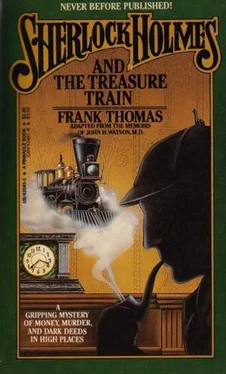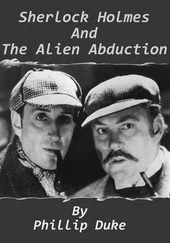I had to admit that Chasseur held us in checkmate. I was horrified when Holmes began to rise from his seat on the bench. His movement drew Chasseur's eye, and the financial charlatan raised the button device in his hand, as though prepared to end it for us all. In that moment, when Chasseur's eyes were glued to the great detective, the man no one was considering moved. My revolver was useless, but there was a walking weapon present who had the uncanny ability to fade into whatever background he found himself. Wakefield Orloff had positioned himself quietly against the wall of the room and had remained there, silent and unmoving, throughout the revelation and drama that followed it. Now his right hand went to the back of his neck and then came forward and down. There was a thud and that wicked Spanish throwing knife that invariably rested in a chamois sheath between his shoulder-blades was buried in the leg of the table beside Chasseur. The Tycoon's finger stabbed at the button in his hand and my heart seemed in my throat; but there was no blast of explosives—no carnage, destruction, or death. Orloff's knife had severed the wire neatly, and Chasseur's dynamite trap had been defused.
I swept up my gun, but already Orloff was beside Chasseur, affixing manacles to his wrists. There was a universal sigh of relief from those present to which I contributed.
Chapter 21
Aftermath
TWO MONTHS had passed since the conclusion of what I titled "The Adventure of the Treasure Train." A bright morning sun had dispelled the fog of the previous night and was streaming into our sitting room. Breakfast had come and gone. I was collecting my notes on the schemes of Alvidon Chasseur, with the thought of recording the matter for posterity. Holmes, as was his custom, was perusing the morning papers.
"Here now, Watson," he said suddenly. "We are mentioned by the press and in connection with a strange matter indeed."
I abandoned my work, intrigued of course, and somewhat surprised that Holmes was not regarding me with twinkling eyes, for he viewed newspaper accounts of his exploits with a humorous attitude. Instead, there was a faraway look in his eyes as he folded the journal in half to facilitate reading it to me.
MYSTERIOUS MURDER IN HOLLAND
In Liege but yesterday a resident of the city was felled by what the citizenry are referring to as "the bullet from the sky." Near the town square, Sydney Kokanour, said to be a traveling salesman, was killed instantly by a bullet in his heart. He had lived quietly in Liege since 1891 and was not known to have enemies. Though baffled, the local police have approached the case with the expertise of England's own Sherlock Holmes. The bullet still being in the body, they have established, through the new science of ballistics, that it was fired from a Sharps rifle, a weapon manufactured in America. No one with a rifle was seen anywhere near the vicinity; and there is considerable feeling that the gun might have been fired by mistake, with the bullet, almost spent, unfortunately claiming a victim. Chief Inspector Pyrott of the Liege Police does not concur with this, citing the notorious range of the Sharps Company product. He is of the opinion that some enemy of Kokanour from overseas is behind the matter. An extensive search for such a man is under way.
Holmes lowered the paper, and there was a long silence between us.
"Inspector Pyrott might well be right," he said.
"Indeed, for we have heard mention of the Sharps rifle and in this very room."
"Kokanour took up residence in Liege in 1891."
"The very year you smashed Moriarty. You think Kokanour was Lightfoot McTigue, don't you, Holmes?"
"The thought has crossed my mind."
"But our American friend would have had to know of the assassin."
"He might have caught wind of him while working for Chasseur."
"You feel, then, that he tracked him down?"
"I am considering the possibility that someone was grateful that his considerable past was not exposed; and with that fierce sense of loyalty, not uncommon with those of the frontier, he tried to repay his debt the only way he knew how."
I chewed on this idea for a while. Holmes had risen and was gazing out our bow window. Finally, he turned to me. "You know, Watson, I've been rather waiting for you to bring the matter up. Now, considering this news, which just may impart a meaning only you and I can understand, I cannot hold my curiosity in check any longer."
"Relative to what?" I queried, but I knew. He had heard me on that momentous afternoon in Essex. Well, it had been enjoyable to cherish my own little secret for a while.
"Our imposter friend. The pseudo-Ledger."
"You disagree with his story of how he came upon the scene?"
"No. That holds water. The idea of a wanted American desperado assuming the identity of a fallen friend and matriculating to Africa and then England is plausible."
"What, then? We could hardly ask the chap to tell us the whole story. After all, he saved our lives."
"Agreed," said Holmes. "But you referred to him by name—McCarty—and he did not deny it."
"There's a story that goes with it," I said, savoring the words.
"I'd like to hear it."
"It begins with the Lincoln County cattle war."
"You mentioned that during our investigation of Trelawney's death in Shaw."
"So I did. Both sides of that bloody frontier incident hired fast guns, and they flocked to New Mexico from everywhere."
"Including the true Ledger," interrupted Holmes in an impatient manner. "I understand all that."
"The Lincoln County war ended in eighteen seventy-eight, with the near total extermination of one side. A survivor was William Bonney, better known as Billy the Kid. The area was under martial law, and General Lew Wallace offered Bonney amnesty."
"Wallace? The same chap who wrote Ben Hur? "
"Correct. Bonney refused the general's offer, pointing out that if he hung up his guns, he would not live to see the next sunrise. Later, in eighteen eighty, he was captured by Sheriff Pat Garrett but escaped from jail. Garrett trailed him and shot him in eighteen eighty-one."
"You are indeed a fund of information, Watson; and I recall your mentioning this Billy the Kid previously. But what has this to do with our adventure?"
"There are a couple of holes in the story. For one thing, Bonney was supposedly killed in Fort Sumner, New Mexico, where he was very well liked. For another, Sheriff Pat Garrett was a friend of his."
"Ah-hah!" said Holmes. "You feel all was not as it seemed."
"Rather sure of it. You see, Bonney's real name was Henry McCarty."
The jaw of my friend Sherlock Holmes actually dropped in astonishment. It was a glorious moment, which I shall always cherish.












